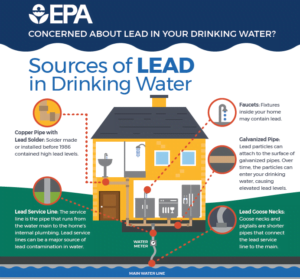Lead is one of the most common heavy metals found in drinking water. Like pesticides, lead is very harmful to human and animal health. Where does it come from in surface water? Three main “culprits” can be named here: road transportation, industry and fertilizers.
Lead harms more than just the brain

In ancient times, lead was thought to be responsible for the occurrence of mental disorders. Its presence in the body results in abnormalities in the functioning of the brain and nervous system. The following ailments can be mentioned here: aggression attacks, hypersensitivity, slowed reactions, hearing loss as well as problems with concentration, balance and disorders of normal growth. But these are not the only ailments associated with lead. Another group of ailments caused by the presence of this harmful metal are cancerous diseases. They particularly concern kidney, stomach and genital cancers. Moreover, constant poisoning of the body with lead can lead to a number of other consequences such as anemia as well as damage to the nervous system, kidneys and bone marrow.
Effects of lead on children
Contact with lead is particularly dangerous for children. Their bodies retain as much as 50% of the lead taken in with food and water (in adults it is only 10%). As a result, such contaminated children cannot develop properly as lead affects their mental development. In addition, these children may suffer from hyperactivity, mental sluggishness and aggression.
Lead builds up
The human body tries to defend itself against lead by excreting it through the kidneys. However, the element is still deposited in the human body – especially in the bones, teeth, hair and nails. Most importantly and dangerously, lead is never broken down. It accumulates in the body throughout life. The best way to counteract this process is to avoid ingesting lead with the water you drink.
Protect yourself!
Maximizing the purification of water from harmful chemicals is essential to staying healthy. In the case of lead, the consequences of its accumulation in the body can be long-term and irreversible. Consequently, it’s a good idea to prevent them as early as possible.
For more information on lead in water, check out the EPA website.

